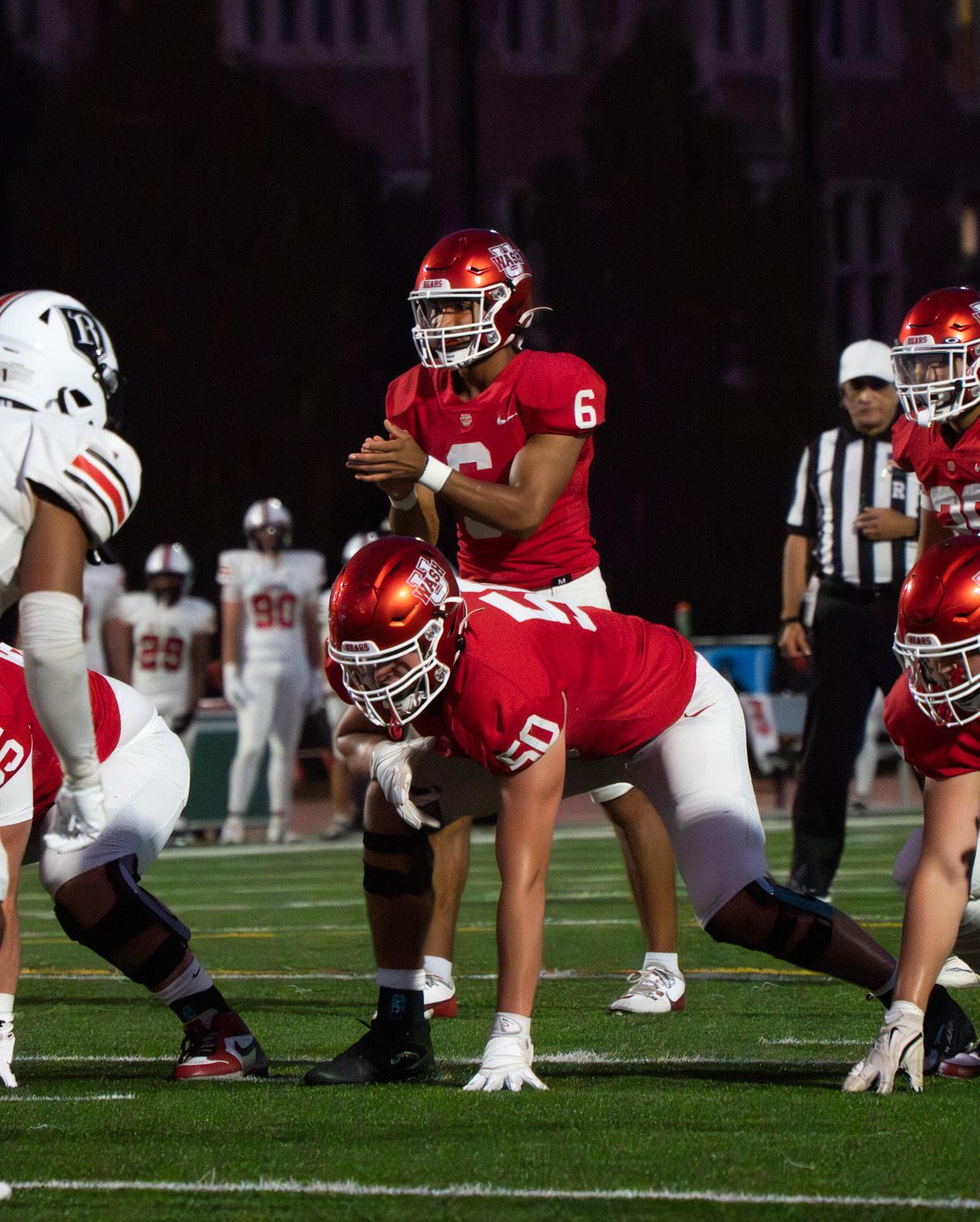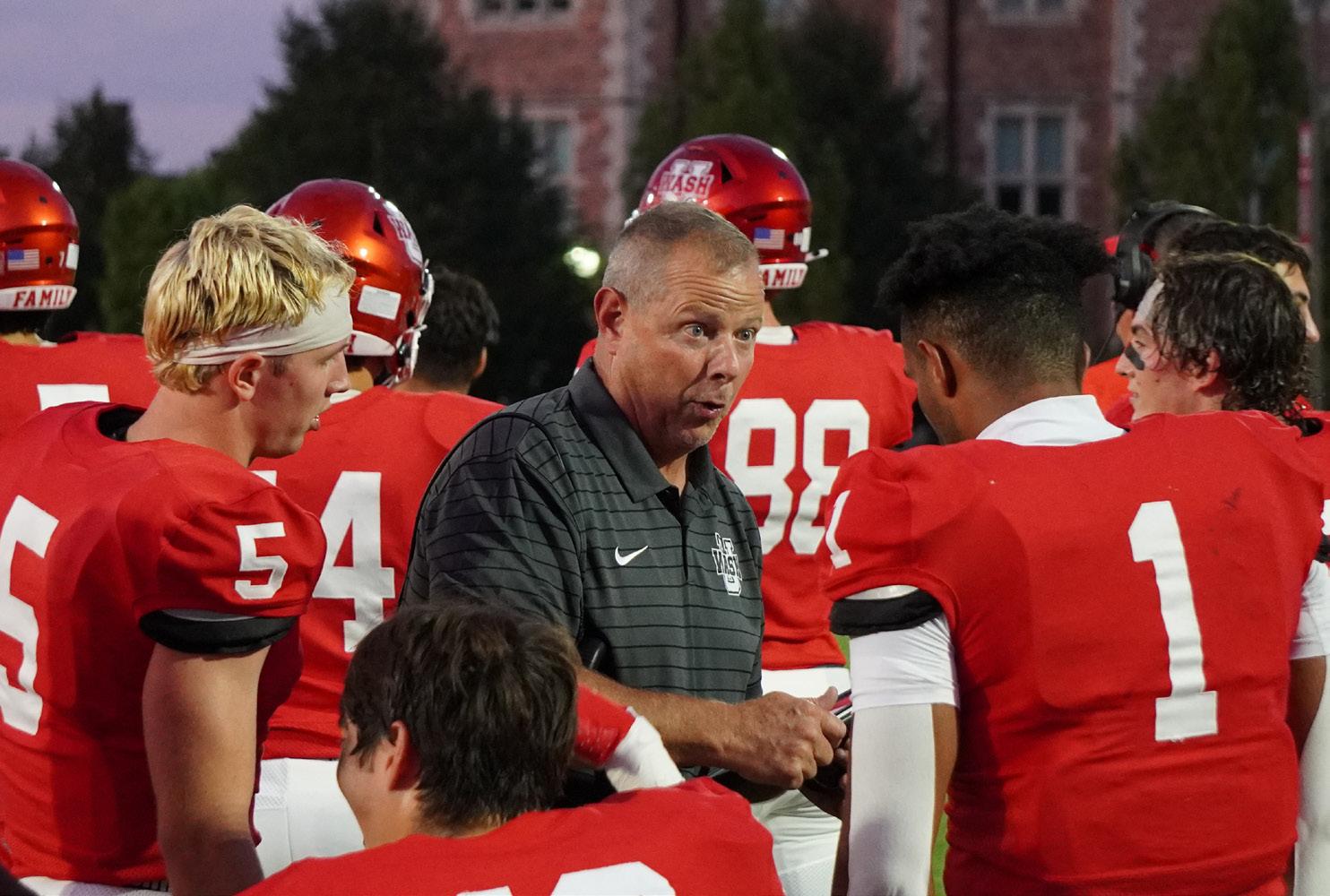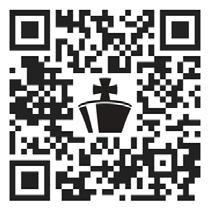
OH, THE PLACES YOU’LL GLOW! A Balloon Glow photo essay. (Scene, pg 3)

LATE-NIGHT SNACKS, ANYONE? Food options should stay open later. (Forum, pg 5)
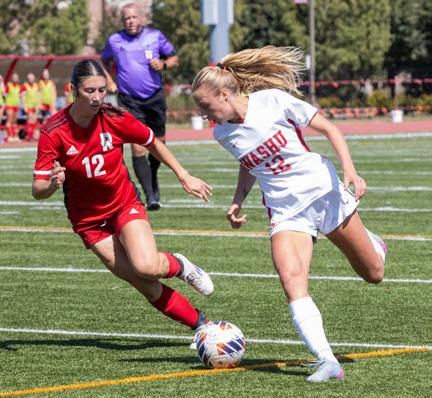
KEEPING THE STREAK: Women’s soccer improves to 7-0-1. (Sports, pg 7)


OH, THE PLACES YOU’LL GLOW! A Balloon Glow photo essay. (Scene, pg 3)

LATE-NIGHT SNACKS, ANYONE? Food options should stay open later. (Forum, pg 5)

KEEPING THE STREAK: Women’s soccer improves to 7-0-1. (Sports, pg 7)
If you were in the Skinker DeBaliviere neighborhood this weekend, you might’ve heard echoes of a kazoo, seen kids dancing with their grandparents in the street, or watched neighbors scattered on lawns, clapping to a beat. Music drifted from porch to porch, carried by a restless breeze, and entire blocks
turned into a single, sprawling stage.
At this year’s PorchFest, the audience was just as varied as the music. WashU students sat perched on curbs, watching neighborhood kids race down the street. Families wandered in from Soulard, Cherokee Street, and even farther to enjoy an afternoon of music, dancing, and fun.
For a few hours, front porches became stages, sidewalks turned
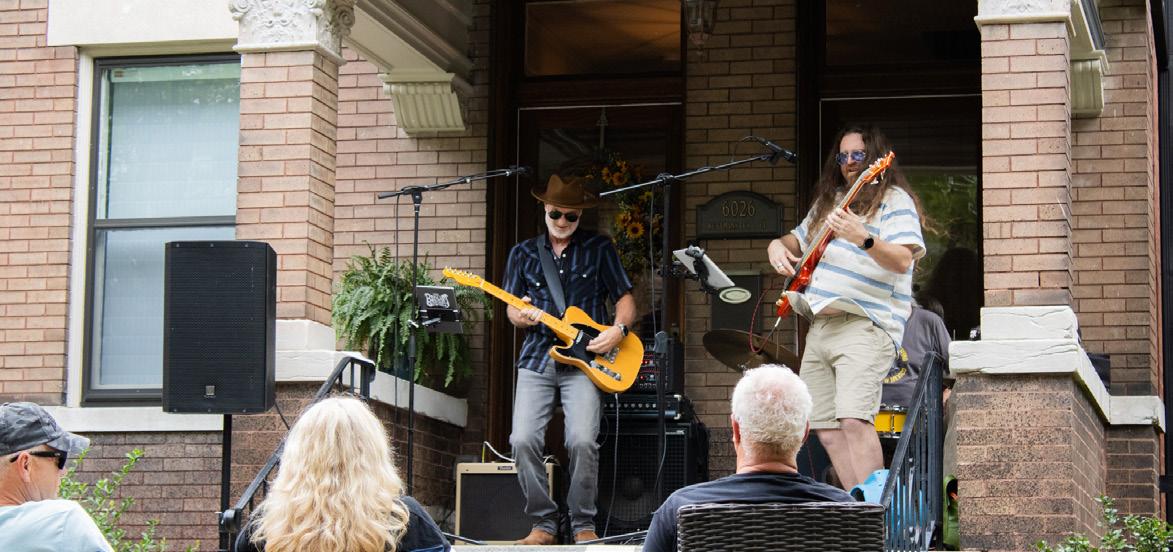
into audience rows, and the usual boundary between WashU and the community blurred.
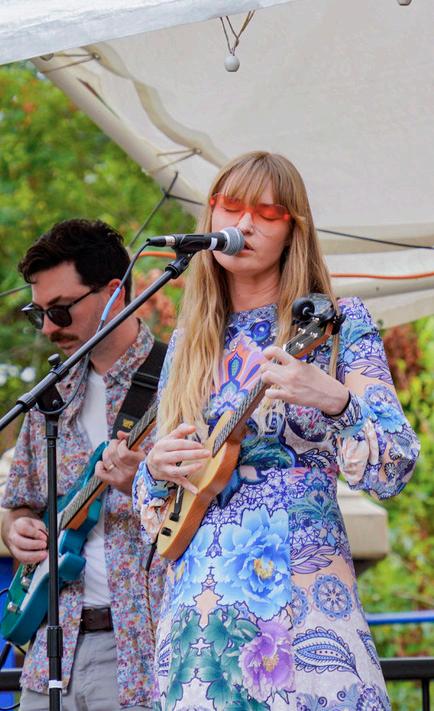
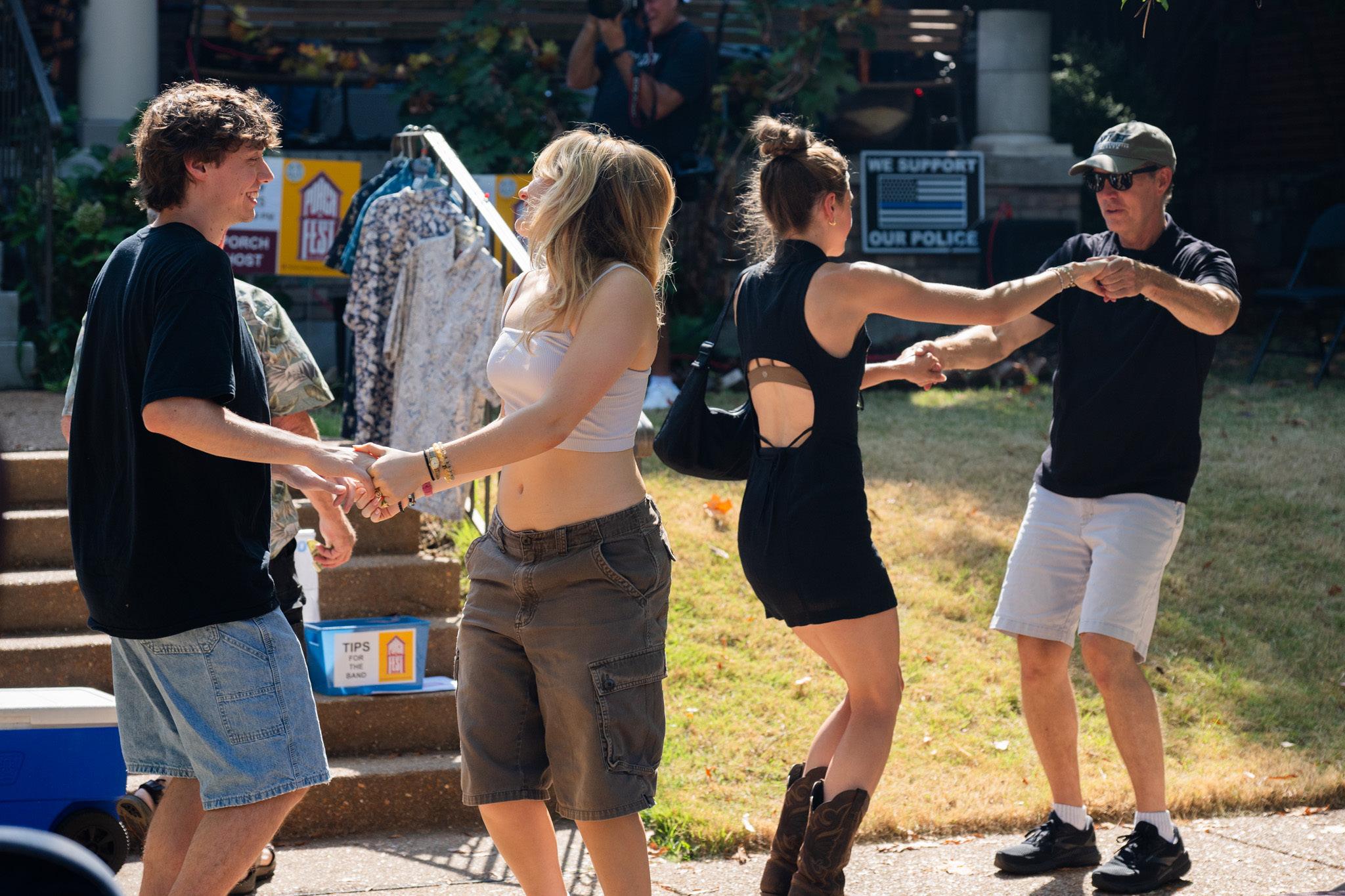
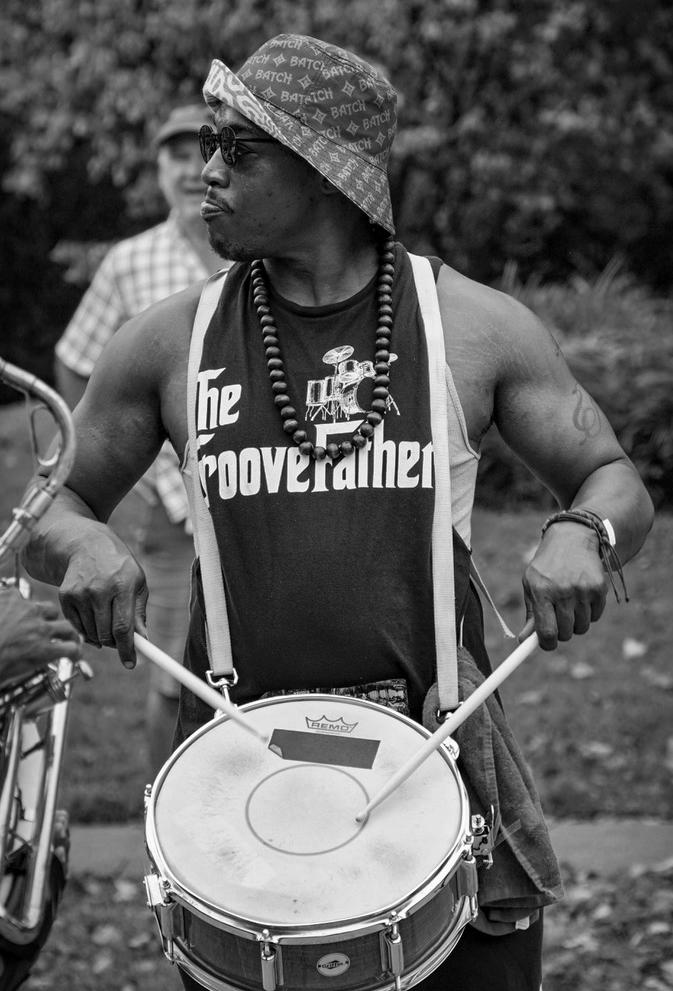
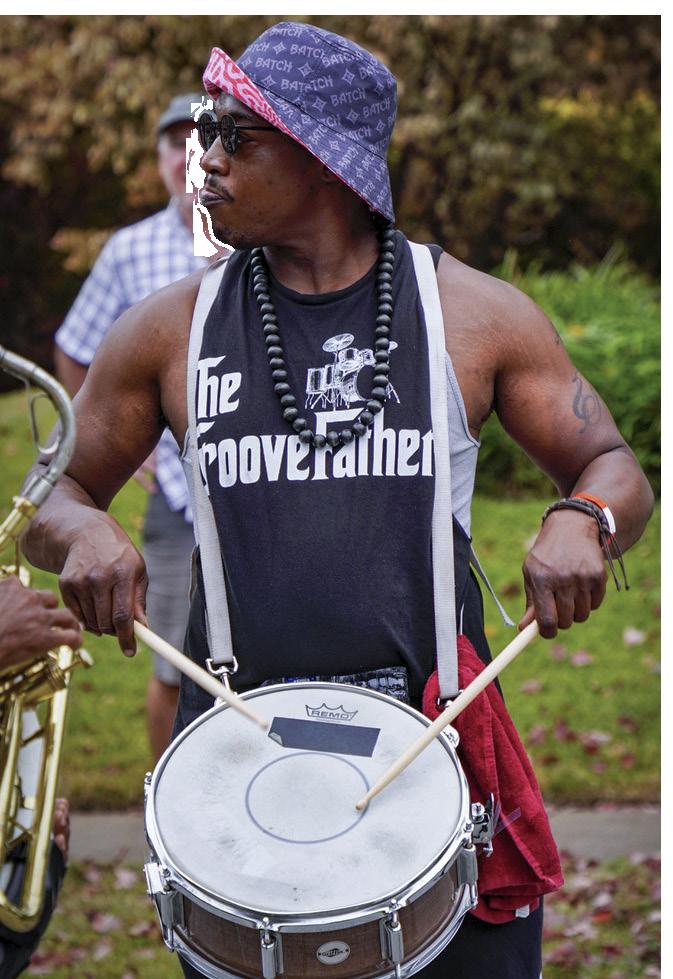
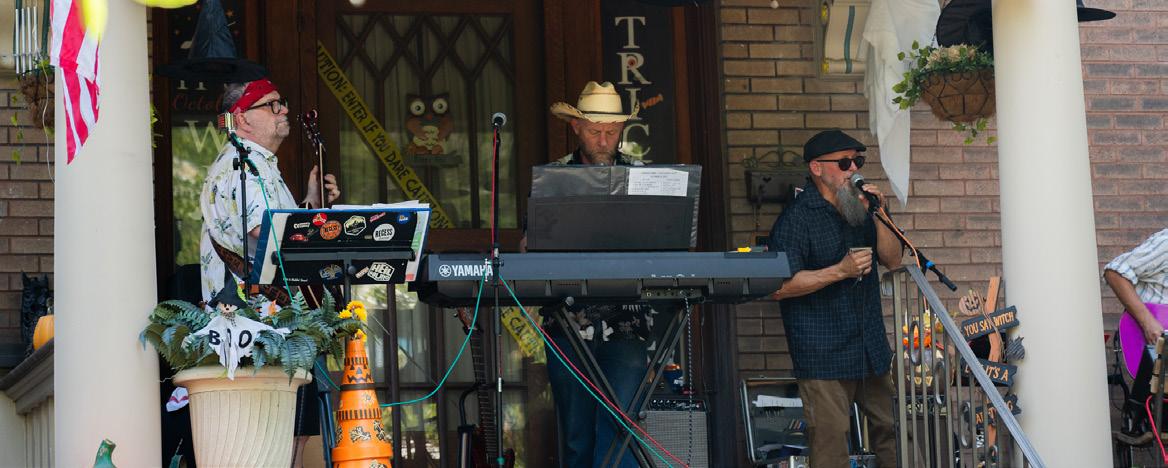
Rudolph Clay and Clara McLeod, two longtime WashU subject librarians, were let go over the summer as part of WashU Libraries’ budget restructuring.
Clay’s research specialties were African & African American Studies (AFAS) and Urban Studies, and he was a Senior Lecturer in African American Studies and the Head of Library Diversity Initiatives and Outreach. McLeod assisted students and faculty with research in Earth and Planetary Sciences. Both Clay and McLeod worked for WashU Libraries for over 30 years.
Mimi Calter, Vice Provost and University Librarian, confirmed in a statement to Student Life that University-wide budget cuts have impacted the library. Calter wrote that she “cannot comment on matters related to specific personnel.”
“The Libraries were asked by University administration to make budget cuts for fiscal year 2025-2026. That cut resulted in reductions to our library materials budget (i.e. collections) along with position eliminations and some administrative changes,” Calter wrote in an email comment to Student Life.
The Libraries’ website indicates that Clay and McLeod’s
former subject librarian positions are filled in an interim capacity by other librarians. Calter declined to answer a list of questions including inquiries into new hires and the future of Clay and McLeod’s research specialties at the library.
“As we face the challenge of making the University more efficient, the libraries remain committed to our mission and to
2025,” McLeod wrote.
McLeod wrote that she felt the termination process did not reflect WashU’s values.
“I was saddened that I was being terminated from a community that I considered as family for the last 40 years. I felt that the termination process that occurred to me was not indicative of WashU[’s] commitment to treating its community with
Shanti Parikh, chair of AFAS, said that she felt a personal “void” in the wake of his termination.
“He had his quiet strength behind him. … Very soft-spoken, but extremely organized and extremely reliable,” Parikh said.
“If any of us ever needed to find something, we would send it to Rudy [Clay], and he would be able to dig and find it for us.”
“She’ll always be part of our department, whether or not the University is employing her.”
supporting all WashU’s academic departments,” Calter wrote.
McLeod was informed of her termination six days before her final day of employment, according to McLeod’s statement to Student Life.
“I received an email late in the afternoon of June 24 requesting my availability for a meeting with the Vice Provost and University Librarian, Mimi Calter, on June 25 at 1:00 p.m. I was informed at that meeting that I was being terminated for financial exigency and that my last day of employment at WashU would be July 3,
respect, dignity, and humanity.”
The chair of the Department of Earth, Environmental, and Planetary Sciences (EEPS), David Fike, agreed that the termination appeared to be sudden.
“We were surprised by the abrupt termination of Clara McLeod and saddened by the way in which it was handled,” Fike wrote in an email to Student life.
Similarly, Clay’s former colleagues in the AFAS Department said they felt shock and disappointment after learning that Clay’s position was terminated.
Clay was considered to be a valued member of the AFAS department.
“He was part of our community, he came to our faculty meetings, … he promoted [library] events, he asked how the library could be of use,” Parikh said. “So he was a really good connector between an academic unit and just the library in general.”
Clay’s absence is not only felt by faculty but also current and former students.
Per Professor of History and AFAS Timothy Parsons, Clay
helped one former WashU student write a book chapter about the history of the WashU AFAS department by setting up interviews with former students who advocated for the department’s creation in the 1960s.
Senior Halla Jones shared that Clay’s termination has affected her two-year research project on overlooked histories of African American art for the Merle Kling Undergraduate Honors Fellowship.
“I no longer have a person in WashU Libraries who fully understands the complexity and nuance of conducting research in Black studies, and the limited archive it has, and I am left to fend for myself in an institution that already prioritizes the dominant narrative of history,” Jones wrote in an email to Student Life. McLeod’s colleagues in the EEPS department echoed many of the comments made by Clay’s colleagues in AFAS.
“Those of us that have been here a long time just really enjoyed always working with Clara [McLeod],” said Douglas Wiens, a professor in the EEPS department.
KATE MATTHEWS CONTRIBUTING WRITER
Two WashU law school student organizations — the Latin American Law Student Association (LALSA) and the Black Law Students Association (BLSA) — came together to inform the WashU community about the broader implications of immigration law and due process. Their efforts culminated in an open “Know Your Rights Symposium,” which was held on Wednesday, Sept. 17, in Crowder Courtyard.
Organizer Yael Rojo, a second-year JD candidate at WashU and vice president of LALSA, wrote to Student Life that the event was intended to help educate community members on their rights according to the law.
“[BLSA and LALSA] thought shedding light on what the law actually says and the rights that people have would be very useful to not only WashU students, but the greater community in general,” Rojo wrote.
“[This symposium] shows how much we as students care about one another,” Rocket said to Student Life at the event.
“It shows how invested we are in our communities and in things that are happening beyond our immediate situations here as law students.”
Sofia Navarro, president of LALSA and a second-year JD Candidate at WashU Law, said in a speech at the event that this past year has been difficult for many in her community, speaking from her perspective as a Colombian American and daughter of immigrants.
“In dark times, there’s always people fighting for you,” Navarro said.
Sumaiya Zaman, a second-year law student who attended the event, said the event was timely because immigration issues are in the spotlight both in and around the WashU community.
“It’s important that we know everything that is going on [and] what rights we do have, [so] we can protect ourselves to the best of our capabilities,” Zaman said.
The event featured a networking period, followed by a presentation from Remi Gavlick, a staff attorney from the Migrant and Immigrant Community Action Project
Daryn Rockett, a thirdyear student in WashU’s JD/MSW program and president of the BLSA chapter, said that the event also drew inspiration from the Emergency Town Hall, which was held in April by various WashU undergraduate organizations in response to immigration crackdowns.
from page 1
EEPS chair Fike praised McLeod’s depth of knowledge.
“She was always available to track down obscure references and brought ideas for how to bring her expertise to bear on any number of assignments and research projects,” Fike wrote in an email to Student Life.
Michael Wysession, an EEPS professor, said that McLeod clearly loved her job.
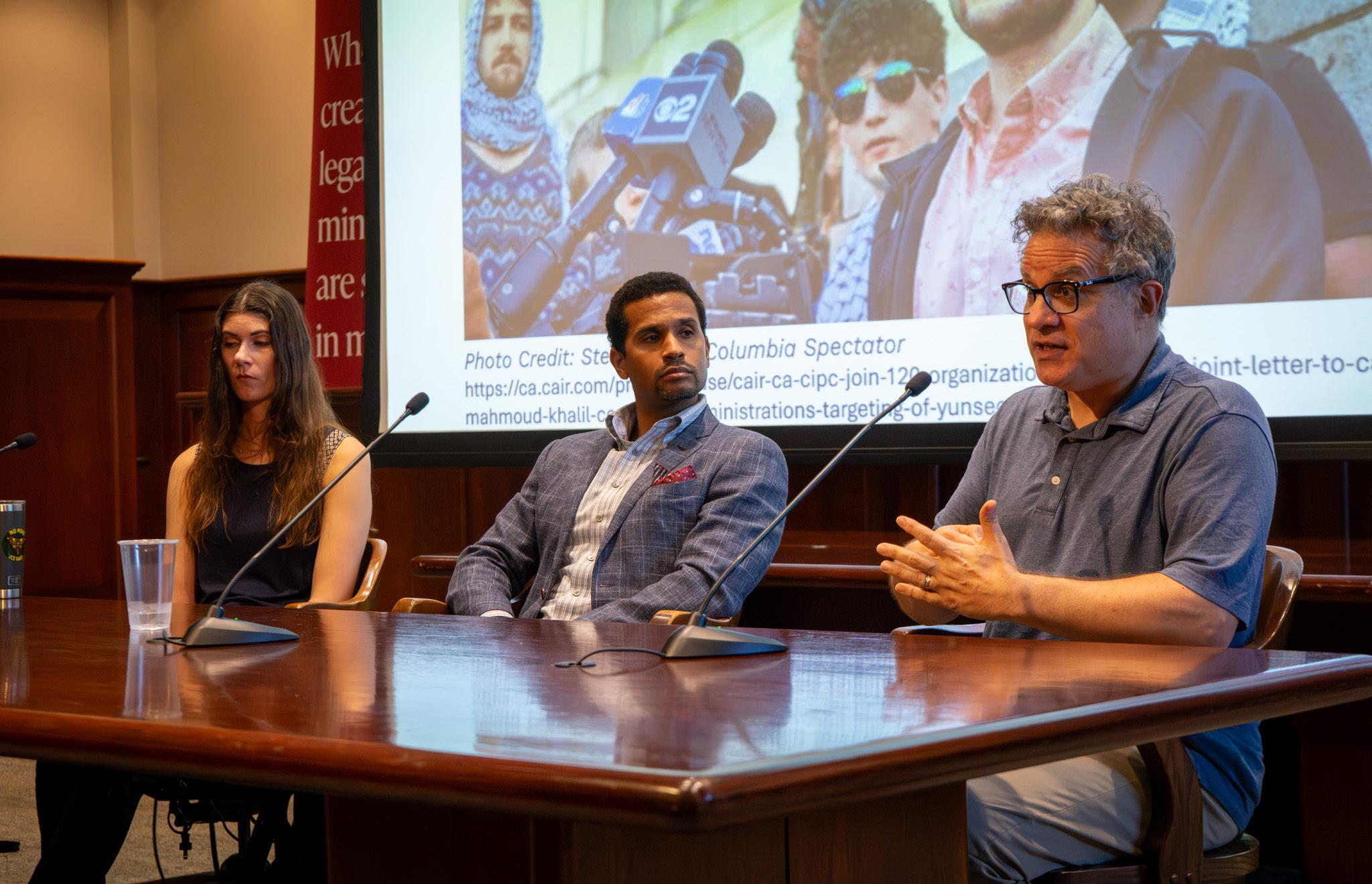
(MICA) in St. Louis, about asylum law and modern immigration policies.
In her presentation, Gavlick said that asylum proceedings are difficult to win, but emphasized that everyone, regardless of their citizenship status, is protected under the Fourth Amendment. She added that individuals approached by immigration officers should ask to see a warrant to ensure they are not subjected to unlawful searches or seizures.
After Gavlick’s presentation, there was a Q&A panel with Gavlick and WashU Law professors Greg Magarian and Sheldon Evans. Magarian said that while First Amendment rights are protected for citizens, they are underdeveloped for others, making it easy for the government to intervene.
Both professors also warned that the increasing allocation of resources to immigration enforcement and limited government oversight are a dangerous
combination, despite existing legal safeguards.
“There is the law in theory and the situation on the ground,” Magarian said.
Lila Steinbach, a firstyear at WashU Law who attended the event, told Student Life that it was jarring to hear professors talk about people’s safety being in jeopardy. Steinbach also said it’s important for people to know what’s happening, especially in a time where information is scarce.
Gavlick said that the ongoing political targeting of immigration in the United States is difficult. She said she has had to process that most of her clients here in St. Louis are going to have unfavorable outcomes. She noted two things that help her persevere.
“They don’t own the four corners of your mind,” Gavlick said. “Joy is resistance.”
“She’s smart, competent, dedicated to her work. She loves the printed word,” he said. McLeod’s expertise in her field was recognized by the Geoscience Information Society (GSIS).

An article published by The Source in 2019 celebrated McLeod’s receipt of an award from GSIS for “significant contributions to the field of geoscience information.” In the article, Denise Stephens, the former Vice Provost and University librarian, praised McLeod as a “trusted partner in faculty research” and “a respected member of the libraries and broader WashU community.” When asked about what
her next chapter will be, McLeod wrote, “I know that the University is facing challenging times and my hope is to continue a relationship with the University. … I am extremely thankful and humbled by the support I received from the community during this difficult time.”
Wysession said that McLeod continues to be important to the EEPS department.
“She’ll always be part of our department, whether or not the University is employing her,” Wysession said.



Even faculty and students who never met McLeod may have seen her last name on campus.
Clara McLeod’s late husband, James McLeod, was Vice Chancellor for Students and Dean of the College of Arts & Sciences. According to Wysession, Clara and James McLeod “were very much a duo.”
Clay was also known throughout campus and even the greater St. Louis area. In 2016, Clay served as president of the Friends of Julia Davis Branch Library, a branch of the St. Louis Public Library.
Rafia Zafar — WashU Professor Emeritus in English and AFAS — noted that Clay once invited her to give a talk at the Julia Davis library which inspired Zafar to give public talks afterwards. Although Zafar is
now retired and living in New York City, Clay has continued to influence her community involvement.
“If I’d encountered someone like Rudolph Clay as an undergraduate I might have become a university librarian instead of a professor — really. In fact, now that I’m retired I have joined the Schomburg Center for Research in Black Culture (New York Public Library) as an official volunteer, helping to process donations; Rudolph Clay … inspired me to do library work as a retiree,” Zafar wrote in a comment to Student Life.
Clay was involved with the Trailblazer Award for Black alumni and faculty and helped plan WashU’s annual Martin Luther King Jr. Day commemoration for over 10 years.
“One of our Mellon Mays [Undergraduate Fellowship] students from a while ago became interested in library sciences because she worked so closely with him,” she said. William Maxwell, a professor in both the English and AFAS departments, described Clay as uniquely kind.
“He gave a lot of light. … [He was] an extremely kind man. People like to say that kind of thing about people, but Rudy [Clay] really was that. He still is, but he’s unfortunately not working for WashU any longer.”
Alongside his contributions to programming at WashU, Clay’s personal qualities left an impression. According to Parikh, Clay had a knack for connecting with students.
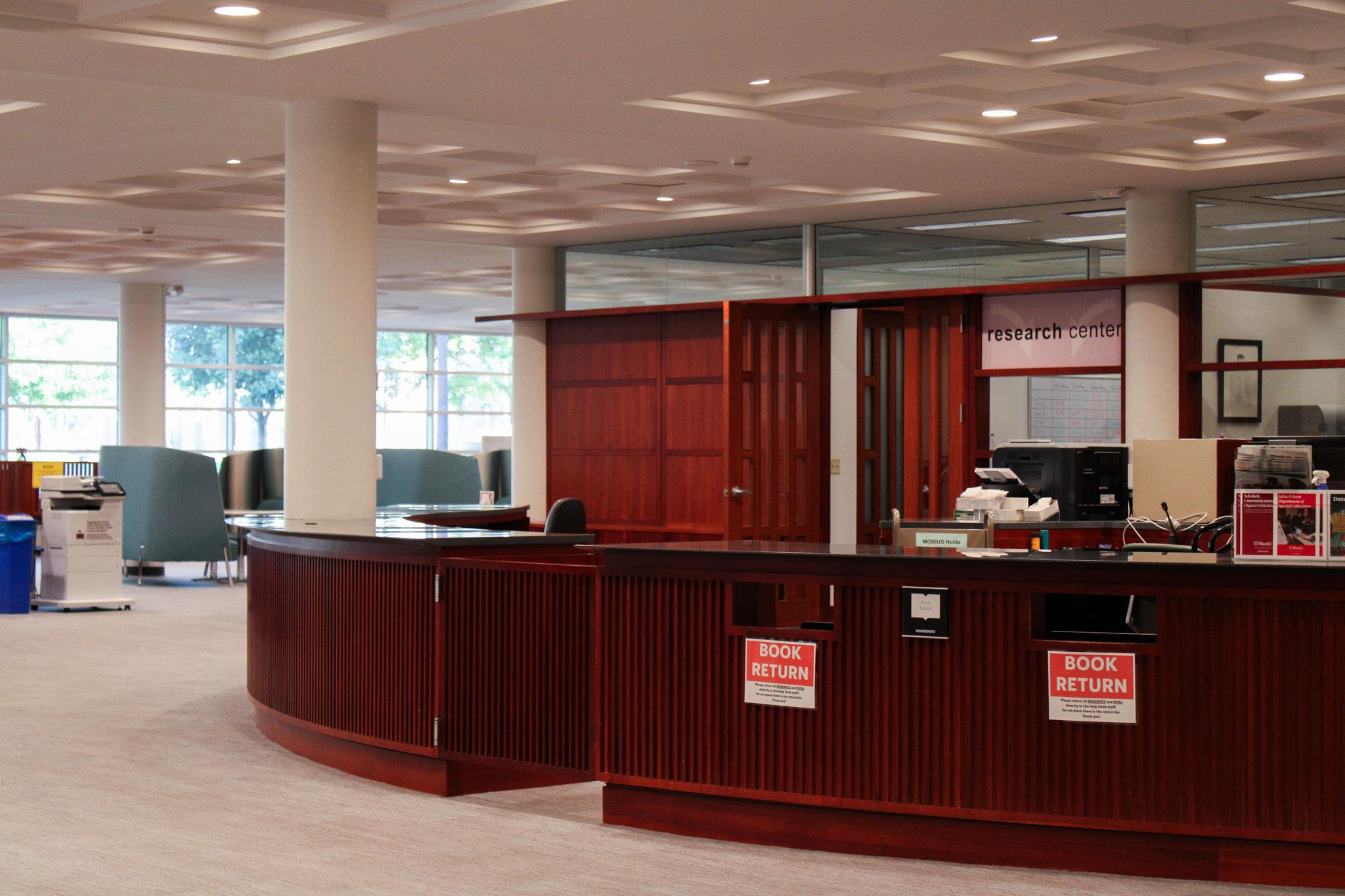

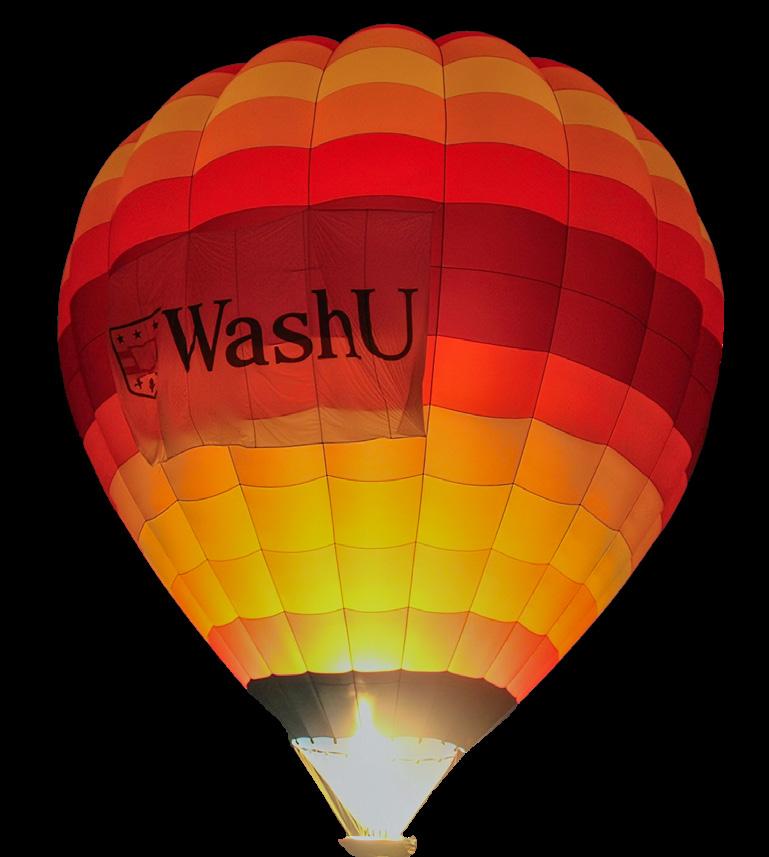



IRIS
When they started filming casual cheesecake reviews, first-years Jack Judge and Alex van der Voort didn’t expect to rack up thousands of views on TikTok. Now they can’t even go through a StudLife interview without being recognized.
“I’m telling you, the ego’s at an all-time high,” van der Voort said.
What began as an infatuation for cheesecake has turned into a local internet sensation. Having gained a large following, their TikTok account, @cheesecake.lovers2, is tasked with
out a new cheesecake, discussing its flavor, then ending with a final outof-10 rating for each pastry.
“I’m not gonna lie, it’s a lot of intuition. You know when you can, like, feel a good cheesecake?” van der Voort said.
Introduced by a mutual friend, Judge and van der Voort first met at the gym. A few weeks later, they ended up at Cafe Bergson together, where they split a fateful slice of a classic cheesecake.
“We were like, that’s kind of gas. We should do mukbang videos of this,” van der Voort said.
It wasn’t until the two shared a Peach Hot Honey Cheesecake from Corner 17 a few weeks later that
good. We were like, we’ve gotta start reviewing these,” Judge said.
Since then, they’ve dedicated themselves to reviewing the many cheesecakes on the WashU campus. Although the two wouldn’t exactly describe themselves as TikTok savvy, with the help of a few friends who serve as their cameramen, their videos quickly gained traction. And with that traction came recognition.
“One person told us their mom sent them the video, and that’s how they knew it. A lot of people have other people that don’t go to WashU sending them our videos being like, ‘Do you know these guys?’” van der Voort


Corner 17, we were inter rupted by a fan of the Cheesecake Lovers, stopping by to say hello — just one of the many interactions they’ve had on and off campus, of which Judge recounted shortly after.
“It’s like 12:30 and we’re a mile off campus and walking back, and these two random girls are like, ‘Oh my gosh, you guys are the cheesecake lovers.’ Just the weirdest places and times,” Judge said.
But their growing audience has created a new problem: their supply of novel WashU cheesecake flavors is dwindling. The duo has considered various options, including going past WashU’s borders to the rest of St. Louis or even starting to make their own cheesecakes.
“We should pull up to SLU [Saint Louis University]. That’d be
really funny,” Judge said.
Nevertheless, the future of their account remains uncertain, as Judge and van der Voort consider how far they can stray from their brand: WashU’s Cheesecake Lovers.
“We’re cheesecake lovers, not cheesecake makers,” van der Voort said.
Despite these uncertainties, one thing these two reviewers are certain about is where to find the best cheesecake at WashU and in the surrounding area.
Find below the Cheesecake Lovers’ exclusive ranking of all the cheesecakes they’ve tried so far.
So what’s next for WashU’s Cheesecake Lovers? Whether it’s expanding out to St. Louis or cooking up their own recipes, it is clear that the love they have for cheesecake is far from over.
“Just regular people doing God’s work,” van der Voort said.
Find below the Cheesecake Lovers’ exclusive ranking of all the cheesecakes they’ve tried so far.
5. Peach Hot Honey Cheesecake from Corner 17 Cafe
6. Crème Brûlée Cheesecake from Corner 17 Cafe
7. Tiramisu Cheesecake from Corner 17 Cafe
ELIJAH
LECKERMAN STAFF WRITER
The Kemper Art Museum recently hosted its first concert event of the semester as part of the series “Kemper Unplugged,” with a performance from local band The Wire Pilots. Last Friday at noon, the jazz trio played a quick, 45-minute set in the lobby of the museum — free for everyone.
Kemper Unplugged is a monthly concert series hosted by Kemper in partnership with WashU’s Department of Music, providing free music for the St. Louis community in the presence of the beautiful art at the museum. In fact, this time, The Wire Pilots performed right in the lobby in front of the room’s main painting while audience members sat in rows of chairs facing the band. The 60 or so attendees listened to The Wire Pilots’ instrumental jazz while looking past the band at Ai Weiwei’s “Illumination,” a powerful art piece made entirely of Legos, and looking up to admire Tomás Saraceno’s hanging installation “Cosmic Filaments.” Sophomore TJ Cannistraro was among many in the audience and was impressed by
from page 1
Now in its seventh year, PorchFestSTL has become a neighborhood tradition that transforms Skinker Debaliviere into an open-air concert venue. For WashU, the festival highlights how shared experiences can bring the campus and community closer together.
Associate Director for Programming and Campus Vibrancy, Carynn Smith, says that these kinds of gatherings represent a shift in the University’s relationship with its surroundings.
“The narrative 10 years ago was that [WashU] was the school at the top of the hill
the event.
“[Jazz] is not really something that I listen to a ton on my own, so it’s always good to listen to it in a live setting. I feel like you get a lot more of the human element of jazz music — the improvisation. I think there’s a different level to it when you listen to it live,” he said.
The Wire Pilots’ three members took turns improvising, whether it was Dan Rubright on the guitar, his brother Ted Rubright on percussion, or guest Ben Wheeler on the upright bass.
The Rubright brothers started The Wire Pilots about 15 years ago, but they had been playing music together long before. Dan recalls that when he was in high school, the two would play music in their basement — Ted on the drums and Dan making up melodies on the guitar — continuing to write whatever came to them. Ted eventually went to classical school, and Dan to jazz school, separating their creative paths. Once they both returned to St. Louis and settled down, however, they quickly reunited, and The Wire Pilots were born.
In addition to The Wire Pilots, Dan teaches guitar in WashU’s music department
and ivory tower,” she said. “But now with [events like PorchFest] … we are working to get to this idea that we are partaking in the community in a way that is not just performative.”
Sophomore Emma Margraf reflected on how her experience at PorchFest shifted her perspective on the community.
“Going off campus makes WashU feel bigger and reminds you that even if you live here just for the school year, St. Louis can feel like home,” she said. “I’m from St. Louis, and I haven’t seen a gathering like this in a while. It was super cool to see that the
and has played for the St. Louis Symphony Orchestra. Still, his heart lies with jazz music.
“I’ve always been a composer, since I started playing guitar. I just love making stuff up. I thought that was the coolest thing. … I just love the instrument. Just sitting, [thinking,] ‘What can I do that would be different?’ That’s kind of my genesis,” Dan said.
For Dan, composing a song sometimes takes years, but for “Wild Petunia,” the song came together almost immediately. The song was written in honor of a petunia in front of his house, and it was one of the few songs played that involved zero improvisation. The mellow and comforting leading melodies of the guitar, with the drums and bass providing an intricate sound behind it, resulted in a beautifully joyful sound that truly evoked the natural imagery of the petunia.
The band performed numbers originally composed by Dan, save “Money for the Man,” which Ted composed and performed solely on the handpan drum. There was a nice variety of upbeat songs, ballads, a country-influenced song, and the handpan drum
musicians weren’t famous or untouchable celebrities but just family members and friends.”
Two such musicians and neighborhood residents, Cara and Dan Ristau of West End Junction, emphasized the importance of spaces like PorchFest. They noted the challenges artists continue to face as audiences are slower to return in the wake of the pandemic and how local events like PorchFest help bring the community back together.
“To have a space like this as an artist, where you can showcase your original songs and you have attentive listeners, is pretty rare, so it is amazing to
song, along with their normal jazz, of course. They premiered a couple of new songs and played unreleased songs, including the song “Cowboy Coffee” that contained a unique twang. They also played other songs, such as the opener “Kaaterskill Falls,” that are released on streaming platforms and Bandcamp under the name Dan Rubright.
Taylor Steinbruegge, the Marketing & Digital Initiatives Coordinator for the Kemper Art Museum, has been to many Kemper Unplugged events and
appreciates the special experience of hearing live music.
“It’s always different genres, different performers.
The Department of Music does a great job. The highlight of last semester was Kara Baldus. Each time is different, but it’s just a great way to spend a Friday afternoon on campus,” she said.
The Wire Pilots plan to still create new music together and perform more around St. Louis. Dan has also been promoting his book
“The Musician’s Dilemma: A Guide for Integrating Your Passion for Music with Real Life,” a guide for artists about how to make their passion push through all of the obstacles of life.
The next Kemper Unplugged event is “The Great American Songbook” on Friday, Oct. 17. The concert will feature WashU jazz voice instructor and Grammy Award nominee Candice Ivory along with students in her studio. Come to the museum to sit down and watch the entire 45-minute event, or walk through the exhibits and have a live soundtrack provided for you in the background.
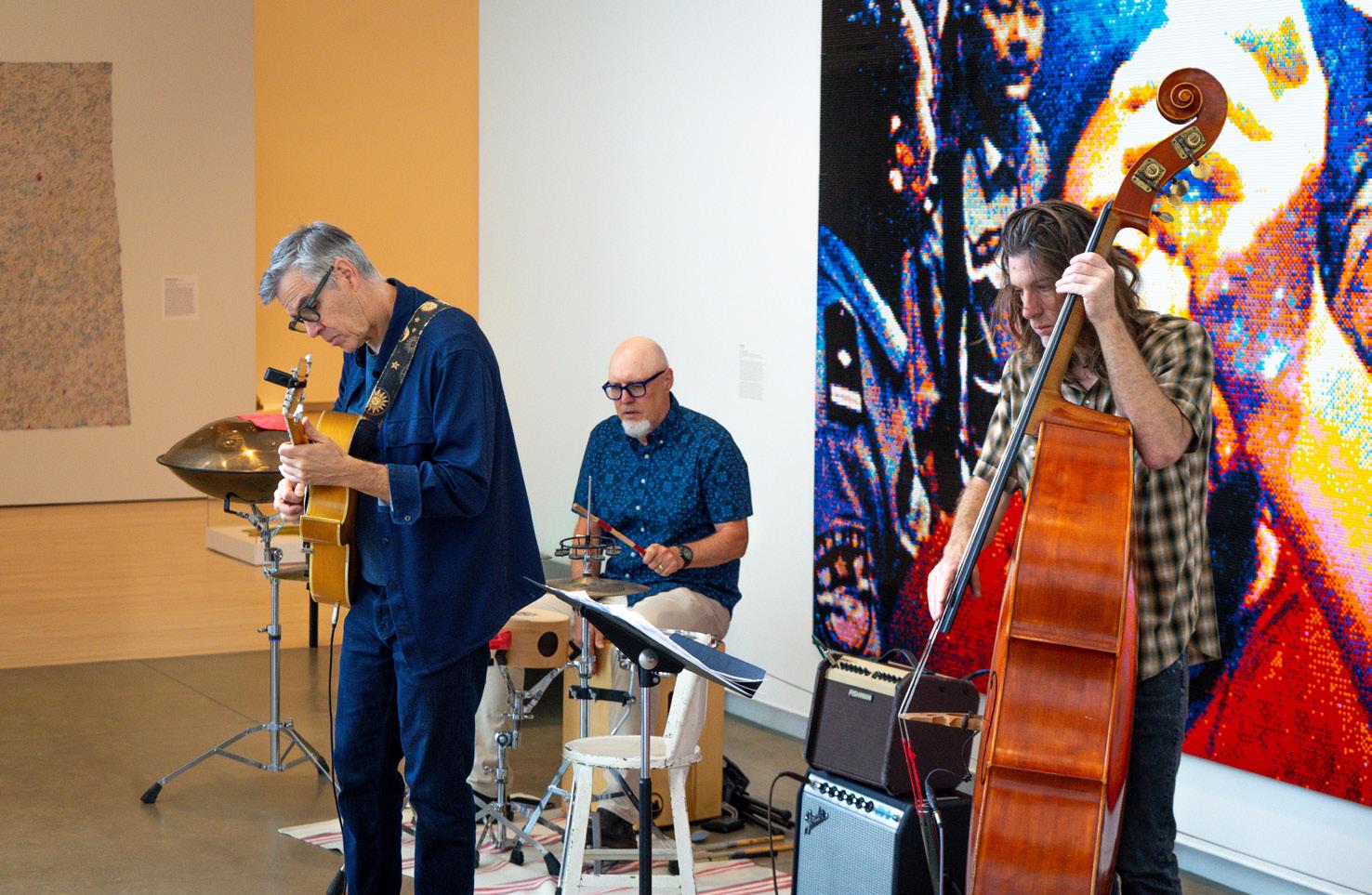
have that here,” Cara Ristau said.
According to Smith, events like PorchFest are just as integral to the student experience as they are to the community. Her goal is to help students realize that St. Louis is not just a backdrop for academics but a city they live in, one that is worth knowing deeply.
“My philosophy is that while you’re here in St. Louis for your four years, this is your St. Louis,” Smith said. “When you’re here, you’re a St. Louisan. I think a lot of students come here thinking that everything is [on campus] … well, that won’t always be the
case. You need to learn your city, learn to mobilize. And hey, maybe you’ll come to find that St. Louis is amazing and you never want to leave.”
For residents, this year’s PorchFest also represents resilience.
“The community is still struggling because of the tornado,” Cara Ristau said, “so to see people come together for something artistic and creative, and [even just] to come out, is awesome.”
WashU Community Relations Coordinator Redell Hendricks pointed out that the headliner, Saint Boogie Brass Band, walked the path of the
tornado that tracked through the neighborhood in May.
“Part of this year’s PorchFest is honoring the fact that we’re still here, and while we’re rebuilding, we’re taking care of each other … and finding a little bit of joy and fun in the small things,” Hendricks said.
That joy, she added, comes more easily when students join in, rather than hover at the edges.
“People in our community very much want to be connected with WashU students,” she said. “Students just have to be willing to show up and be present.”
Sitting in the dungeons of Olin and ignoring texts from my friends is obviously not how I (Darcy Bialick) wanted to spend my third Saturday night of freshman year. Unfortunately, I procrastinated 100 pages of reading all due the next day, and options were limited. Eventually, as my friends pestered me more and more about why I wasn’t joining them for a night out, I realized I owed them an explanation. To my surprise, they responded to my predicament with genuine confusion:
“All you have to do is read? Just ChatGPT-it.”
The now verbified noun of using AI to “complete” readings is nothing new for students today. Such use of AI reveals a problematic perspective on education, in that we are treating it as a transaction:
I do the minimal amount of work possible — enabled by the help of AI — to get
a “good” grade. With said good grade, I can get my diploma inscribed with the words “Washington University in St. Louis.” With said diploma, I can get a job. And with the job, I can get money. And that’s all I need. Right? Wrong; we should treat education virtuously.
We define a virtuous education as the transformative process in which one chooses intellectual hardship in their academic pursuits. The virtuous life is not flashy, it is quiet. You gradually and painstakingly develop your intellectual muscle. This educational philosophy goes beyond the values that our transactional culture has created, including efficiency, profit, return on investment, and the commodification of ourselves. Instead, it focuses on developing one’s mind. But how does one pursue a virtuous education? In an idyllic world, a genuine pursuit of knowledge should embrace a world filled with goodness, truth, beauty, and complexity. We do not live in an idyllic world, though.
Private education is in itself a business. Working is not a passionate pursuit for the vast majority of WashU students; it is a necessity for survival. So, we do not blame those who take the path of least resistance in their education.
With the current unbelievably rapid pace of development in AI technology, it is theoretically possible to go through your entire college experience without challenging yourself intellectually. However, if you choose to pursue education in this purely transactional fashion, you deny yourself the once-ina-lifetime opportunity for college to be a truly transformative experience.
For most of us, college is the last time in our lives that we will have access to a vast array of educational resources, fellow passionate peers, and the free time to become entrenched in our studies untainted by the strict parameters of the “real” or “working” world. Being in the unique environment of college is in itself a privilege. It is
a perfect opportunity to make the most of our free time, not for idleness, but for study, contemplation, and the pursuit of truth in our studies. We classify this approach as intellectual leisure. The etymology of the word school supports this notion. “School” comes from the Greek “schole” meaning “leisure.” The opportunity to pursue an education and the ability to flex your intellectual muscle are inextricably linked. College, arguably more than any other time in our lives, offers us the leisure to think deeply. Take advantage of it. We get to tailor the classes we take to our niche interests and engage with material that we genuinely find interesting. Those who choose to undergo the transformative process of truly learning leave college with a more profound sense of identity shaped by the knowledge they have accumulated and the experiences they’ve undergone.
If you choose the path of AI, you choose to have the supposed “deeper meaning” spelled out for you. That’s

what AI does: it condenses pages of dense text into neat, digestible summaries fit for our addled brains. But in the process, you lose the nuance that you get out of reading a text. You are choosing the path of mental shortcuts.
With the deeper meaning being spelled out for you, you never have the chance to flex your intellectual muscle. You never have the chance to struggle with the pedagogical esotericism that a long
text or full book has to offer. You never have the inspired intellectual breakthrough that results in encountering new ideas and truths about the world. When you never flex your intellectual muscle, it will begin to atrophy. If you choose not to learn, you choose not to change. You will be forever stuck as the person you were the day you discovered AI, or the day you lost faith in yourself to outdo the machine.
Some people eat to live, but I live to eat. I would be lying if I said that I didn’t carefully schedule my days to ensure that I get to eat three full, satisfying meals. However, getting those three meals in has been much more difficult since I arrived at WashU.
I know I’m only a firstyear and it’s a little early for me to be complaining, but the Dining Dilemma, as I’m calling it, has already proven to be a real challenge for me. There are two main problems within the broader Dilemma: a lack of dining facilities open on the weekend and early closing times for the retail options open during the week.
On Saturdays and Sundays, every dining option in the Danforth University Center (DUC) is closed except for Cafe Bergson. As for retail dining, the only places open on the weekends are Corner 17 and Subway, which close at 3 p.m. and 5 p.m., respectively. In other words, seven out of the nine retail dining options and seven out of eight of the DUC’s eating choices are closed every weekend. What does this mean for
students? Well, for two days a week, we must choose from the same six options in Bear’s Den (seven on Sunday at BD), or the same five options from the Village. There’s also Cafe Bergson, Subway, and Corner 17, but none of them are open for dinner, and I don’t know many people who eat sesame chicken for breakfast (No judgment to those who do, though. That stuff’s delicious).
Don’t get me wrong, the food that is open on Saturday and Sunday is great; there’s just very little variety on the weekends. I have legitimately alternated between chicken tenders and quesadillas for most meals, which isn’t the most sustainable lifestyle.
The second big issue with WashU dining is the early closing times of most options outside of BD and the Village. During the week, five stalls in the DUC close at 3 p.m., eliminating them as options for dinner. Four of the retail dining options close by 3 p.m., and most others close by 6 p.m. Again, this leaves us at the mercy of our two main dining halls yet again (really one, if you’re a first-year, as we don’t usually venture out to the Village), which means even more chicken tenders
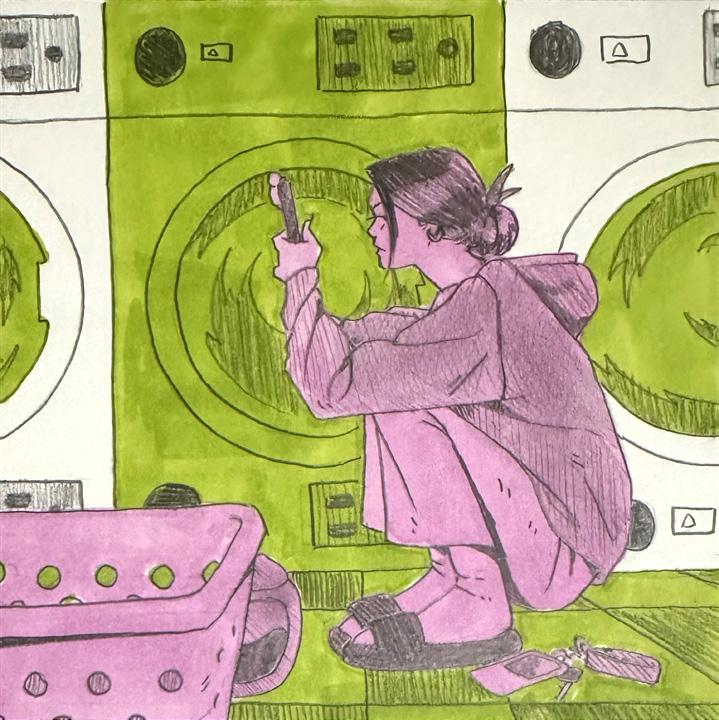
and quesadillas.
I recognize it’s not easy to feed over 3,000 people, and I’m very grateful to the hardworking staff who keep me fed every day. I do, however, know that this lack of variety is not sustainable and has been a source of frustration for many others besides me. (PSA: if you’re looking to make new friends as a firstyear, try talking about how annoyed you are that you can’t find food on the weekend. It’s a great conversation starter.)
My proposed solution is to start off small. If possible, it would make a huge difference to just keep a few more of the options in the DUC open on weekends, even if it’s not all of them. The same goes for the hours; if just a few dining options outside of BD and the Village could stay open until at least 7 p.m., it would be a game changer.
Student Union has actually already started to implement some small initiatives to address the situation. During the fall semester, Student Union is piloting extending hours at one retail dining option for five days a month.
In September, The Fattened Caf had extended hours from Sept. 8 to 12. In October,
Beast Craft BBQ will have extended hours from Oct. 20 to 24, and Lajoy’s Cafe will be open later from Nov. 17 to 21.
According to Student Union Vice President of Engagement, senior Ella
Scott, if this pilot period is successful, it is possible that extended dining hours will be implemented starting next semester.
I understand that solving the Dining Dilemma is not a simple task. However, I believe that WashU students need dining options that both align with our busy schedules and provide variety to keep us healthy and happy. After all, food is fuel, and a lot of WashU students still need fuel after 7 p.m.
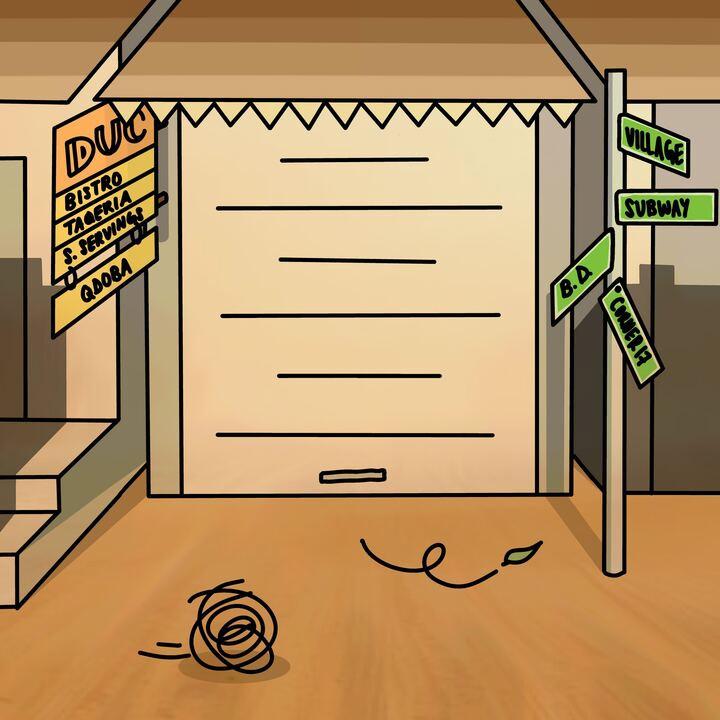
First Place:
Me, bracing myself against an eternity (30 minutes) of misery and anguish (waiting for my clothes to wash) to stave off the depraved ghouls of society (people who immediately dump my clothes on the floor).
Sean Henry, Current WashU Student
Second Place: I don’t know which is more interesting, looking at your face or watching the clothes dry.
Robert Heider, WashU Alum
Third Place: Drying laundry...about as exciting as watching paint dry…
Denise Bader, WashU Parent
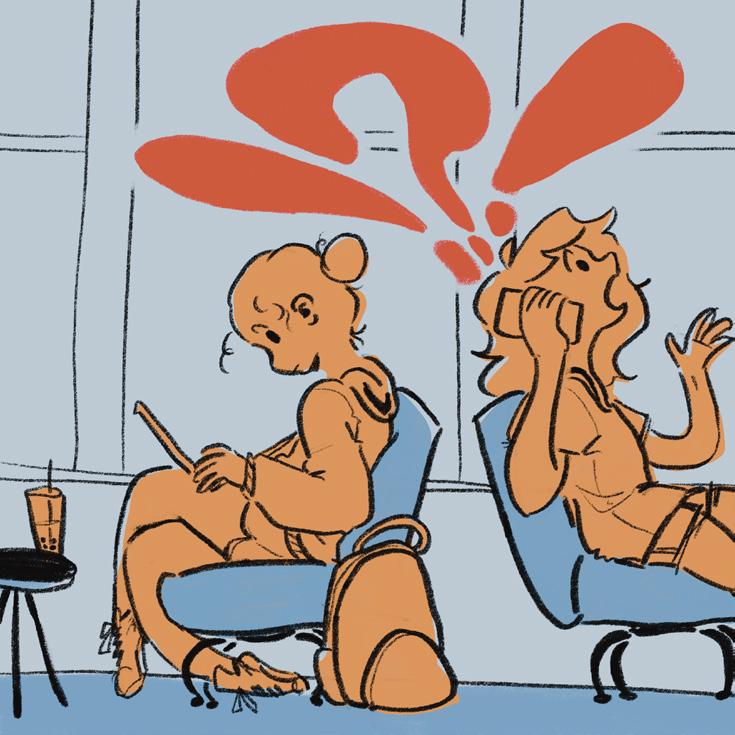
Scan the QR code to enter your submission by 11:59 p.m. on Monday.

On Sept. 10, 2025, Student Life published an article revealing that WashU’s College of Arts & Sciences created a new task force to recommend a potential reconfiguration or combination of six departments: African & African American Studies (AFAS); Women, Gender, and Sexuality Studies (WGSS); Jewish, Islamic, and Middle Eastern Studies (JIMES); Educational Studies; Global Studies; and American Culture Studies (AMCS). This task force, called “Social Transformation,” has not yet made reorganization recommendations but will send them to the Dean of Arts & Sciences by mid-March.
We don’t yet know what this reconfiguration would look like if it went into effect. According to task force cochair Shanti Parikh, the stated aim of the task force is to consider how it could benefit the six departments by “reducing administrative burdens, fostering innovation, and strengthening visibility.” The administrators also justified the idea with the departments’ small sizes and shared focus on social and cultural issues.
The Student Life Editorial staff believes that these six departments — and their academic independence — are imperative to the WashU community, especially given the Trump administration’s attacks on academic freedom, marginalized communities, and Diversity, Equity, and Inclusion (DEI). As such, we are skeptical of the University’s stated
intentions due to their lack of transparency in this process so far.
To start, each of the listed departments that the administration is considering merging is crucial to education at WashU. Most of these departments revolve around or underscore minority cultures and histories. It’s critical that WashU provides and defends such spaces where students can study marginalized identities, histories, and cultures.
We must remember that many of these academic programs had to be fought for, including at WashU: it took an occupation of Brookings Hall by the Association of Black Collegians (ABC) for the administration to create the AFAS department. In broader terms, across the United States, there is a long history of universities suppressing the studies of the systems that keep them in power. Parikh only acknowledged funding cuts as “complicat[ing]” the process, it seems unlikely that funding had no part in the decision to create this task force right now.
The timing of this initiative’s formation is not lost on any of us. The Trump administration has launched countless attacks against academic freedom and significantly cut funding from universities across the U.S. since taking office, largely for their participation in DEI programs or the emphasis on race in academic programs. These actions have also occurred among wider efforts against marginalized communities, such as

mass deportations and the dismantling of civil rights protections.
It’s very likely that the merging of these departments is a result of the Trump administration’s actions against universities. Nonetheless, neither the creators nor members of this task force said that it was erected as a result of the Trump administration; instead, Parikh said the timing was a “challenge.”
Combining the especially politicized academic departments under a different title appears as a way to hide them under a different name. The downplayed rollout of this initiative only reinforces that concern. Along the same lines, it seems unlikely that funding cuts had nothing to do with the creation of this task force. This raises the concern that a recommended reconfiguration would involve budget cuts from the departments.
To begin with, the force’s development was not released in an announcement by WashU, as other University initiatives have been, such as the committee to review DEI programs launched in May. Instead, it was only covered by Student Life. While we understand that projects need to be somewhat developed before their announcement, the initiative had no set announcement date to our knowledge.
When Student Life released news of the task force, many students were taken by surprise, especially those majoring or minoring in one of the six departments. It has affected faculty too; in the Student Life article, AFAS and WGSS professor Marlon Bailey and AMCS Academic Coordinator Karen Skinner expressed “concern, fear, and unsafety” and “a culture of fear and immense stress,” respectively, among
people in their departments. Among students and faculty, no one seemed prepared for this news.
This is not the first time that WashU has shrouded its decisions in secrecy, especially in the context of the Trump administration’s attacks on higher education.
Just to name two examples from over the summer, McKelvey cut the Women in Engineering program with no notification to members of the group and DEI-related content was significantly changed on WashU websites.
In a Q&A with Student Life, Chancellor Andrew Martin said that the combination of these departments was not even “on [his] radar.” The considerations of this new task force should be on everyone’s radar, especially the chancellor’s. When Student Life asked the Dean of Arts & Sciences Feng Sheng Hu about the task force, he declined to comment. These responses suggest that there are no routes of accountability for this potential reconfiguration.
As this task force carries forth its considerations, we urge its members to display transparency about their decision-making process and implement clear pathways for the WashU community to provide feedback, which could include open meetings with the task force, visits to classes under the departments, or a form to provide feedback.
In today’s political climate, we should be fighting to preserve and strengthen these six departments, not conceal
or weaken them. If the task force ultimately recommends a reconfiguration or combination of these departments, students and faculty should be prepared to defend their value.
Staff editorials reflect the opinion of the majority of our editorial board members. The editorial board operates independently of our newsroom and includes members of the senior staff.
Sylvie Richards, Managing Forum Editor
David Ciorba, Senior Forum Editor
Amelia Raden, Senior Forum Editor
Dion Hines, Senior Forum Editor
Kate Theerman Rodriguez, Senior Forum Editor
Lyn Wilkins, Junior Forum Editor
Will Rosenblum, Managing Scene Editor
Sophie Schwartz, Junior Scene Editor
Elizabeth Grieve, Senior Scene Editor
Sara Gelrud, Junior Scene Editor
Bri Nitsberg, Managing Photo Editor
Eran Fann, Photo Editor
Ella Giere, Photo Editor
Grayce Cooper, Managing Social Media Editor
AnaElda Ramos, Managing Illustration Editor


The No. 5 WashU women’s soccer team defeated Rhodes College 3-0 on the road on Sept. 21. This win came less than 24 hours after the Bears beat University of Mary Hardin-Baylor (UMHB) 6-0 on Sept. 20.
This win asserts the Bears’ dominance over the Lynx, as it is their tenth time in a row winning this matchup. While WashU fell in the United Soccer Coaches rating after drawing Trine University last week, they regained their momentum with the weekend sweep.
The Bears started the first half hot against UMHB. Within just the first minute of the game, WashU had two shot attempts. The Bears showed their dominance in the first half by controlling possession and firing 22 shots, compared to the Crusaders’ singular attempt.
Even though they were controlling the game, it took the Bears most of the first half to finally get on the scoresheet. After a free kick followed by a shot deflected off the post, first-year forward Heidi Fesler connected off of a pass from junior Sophie Viscovich to bring the score to 1- 0. This duo had more success just five minutes later: Opposite to their last play, Viscovich was able to score on a pass from Fesler.
This successful duo reflects head coach Jim Conlon’s holistic approach to allowing first-years to be successful through the mentorship of upperclassmen.
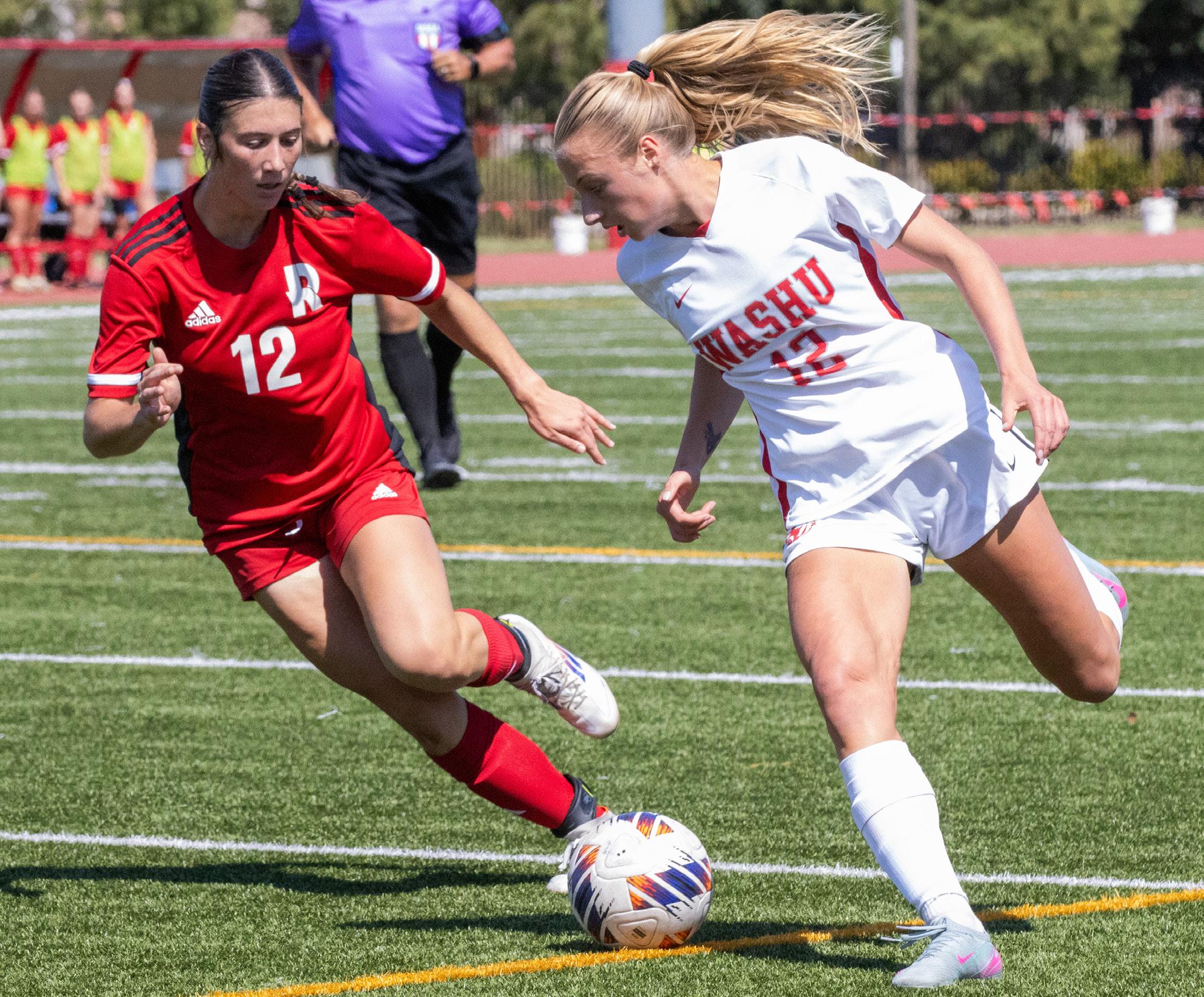
overcome this when they changed their strategy and mindset in the second half.
“I think they have to refocus on understanding what each individual’s gifts were and what the team focus was,” Conlon said. “This really allowed us to propel ourselves in the second half.”
Just 10 minutes into the half, junior Jadyn Aling came flying down from midfield for a big shot and goal, bringing the score to 2-0.
“That’s just what happens when our team comes together … good things happen for us,” Aling said.
Rhodes’ defense was a bit shaken up as the Bears stayed steady through multiple substitutions and constant pressure. The ball stayed on the Bears’ side of the field for most of the second half, allowing for multiple corner kick attempts. At the 59th minute, first-year Noelle Dolan was able to connect with a corner kick to tap in the ball for a 3-0 lead.
“The freshmen have been able to shine, sticking to the gift that they brought into the program,” Conlon said. “The upperclassmen are also doing a great job of mentoring them and making them feel comfortable in our program. It is a holistic approach from the upperclassmen all the way through the rookies, but everyone’s contributing in their own way.”
the season off of an assist from sophomore forward Olivia Clemons. The Bears’ momentum continued, and they tallied a fifth goal just eight minutes later when senior forward Ella Koleno launched the ball into the upper left corner of the net.
The Bears started their second half scoring spree in the 61st minute. Sophomore midfielder Cami Colpitts scored the Bears’ third goal off of a corner kick on a high ball. Just two minutes later, senior forward Grace Ehlert scored her seventh goal of
The game seemed like it was going to end in a 5-0 win, but the Bears still had more up their sleeves with their first-year substitutes. With less than two minutes left in the game, Fesler’s second goal of the game gave WashU a 6-0 lead.
The Bears dominated the Crusaders, but WashU’s
advantage could have been even higher. WashU put up an impressive 31 shots, 15 of which were on goal, compared to UMHB, which only took five shots the entire game. Sophomore goalkeeper Kassidy Lanthier kept a clean sheet, and has only allowed one goal throughout the season.
To round out the weekend, the WashU women’s soccer team stayed strong as they pulled out a 3-0 win against Rhodes, just 24 hours after their last victory. With the Bears pulling out a win in their last 10 matchups against Rhodes, the team was ready
to take on the Lynx a year later, after their 3-0 win in 2024.
The Lynx goalie kept the ball out of the net for most of the first half, but Ehlert put an end to that with the first goal 26 minutes into the game.
“I was just in the right place at the right time to help … get some momentum for the team. It was a great team goal overall,” Ehlert said.
The Bears managed only a couple more shots before the end of the first half, all being stopped by the Lynx goalkeeper or flying high over the crossbar.
The Bears were able to
Cheers erupted in the Field House as the WashU volleyball seniors walked out onto the court on Saturday morning to the support of their teammates, friends, and family. The team honored five seniors: outside hitter Anna Hodell, outside/right side hitter Anna Freeman, middle blocker Eva Boling, setter Sam Buckley, and right side hitter Tori Taylor.
Over the past four seasons, WashU has put up a 93-24 record with three straight NCAA tournament appearances from 2022-2024. This resounding success is a testament to the seniors’ dedication to the team and exceptional leadership.
In Saturday’s games, WashU fought hard to maintain their perfect home record this year, defeating Concordia 3-1 and Simpson College 3-2 in a five-set thriller.
Concordia, 3-1 (25-16, 23-25, 25-20, 25-14)
WashU defeated Concordia in the first match of the day in a steady yet overall dominant victory. After a decisive 25-16 win in the first set, the Bears would go on to narrowly lose the second, 23-25. Still, they maintained their composure, eventually coming back to win the match 3-1.
The Bears attacked early
in both of the last two sets and never gave up the lead. WashU took the third with a series of small runs, none of which were answered by Concordia. They then dominated the fourth set, sealing the victory with an 11-point margin, the largest of the match. Despite early success, the Bears never got too comfortable, maintaining their focus until the final point.
“I thought our team did a great job of keeping our composure throughout both matches,” Buckley wrote in a statement to Student Life.
“Sometimes it can be challenging to stay locked in on Senior Night, but we stayed steady and really compartmentalized each point. Both Concordia and Simpson are gritty teams with very scrappy defense, and I was proud of how we responded.”
Buckley played a significant role in WashU’s victory, directing the attack with 52 assists — more than the entire Concordia team combined.
She currently ranks first across all Division III women’s volleyball with an astounding 11.2 assists per set.
Freeman also had a strong performance with 15 kills, while junior Leah Oyewole led the team with 17. A kill by Freeman, assisted by Buckley, fittingly closed out the final set — a reminder of everything these seniors have given the WashU volleyball program.
Buckley had nothing but
praise for her classmates, citing their accomplishments both on and off the court as a deciding factor in the team’s success.
“I feel very honored to be leading alongside the other seniors, who are such hardworking and humble people.
Anna Freeman and Eva [Boling] get the job done, and we all trust them in high pressure moments. Tori [Taylor] and Anna Hodell give fantastic insight in our huddles and see the court well from that third point of view perspective.”
Simpson, 3-2 (25-18, 1925, 23-25, 25-20, 17-15)
Going into the second game against Simpson College, the seniors continued setting the tone for the tournament. However, it wasn’t just the veterans that made an impact: The first-years stepped up in big ways. Last week, first-year Nia Jones had a breakout start to her first season, setting a school record for most blocks in a three-set match in a game against Greenville. Coming into this tournament, she was ready to defend that record and remind everyone why she’s a force on the court. WashU came out of the gate strong in the second game, dominating the court and taking the opening set 25-18 with relative ease. In the second and third sets, the Bears struggled to maintain momentum. Simpson
narrowly edged out WashU, taking the sets 19-25 and 23-15 respectively. Despite their setback, WashU came back with a fourth set win, 25-20.
“After taking the first set, we sometimes tend to get a bit too comfortable, which can lead to dropping points we should be securing,” Jones wrote in a statement to Student Life.
In the final set, each team slowly crept toward the 15 points needed to secure a victory. When the game was tied 11-11, WashU served the ball over, and Simpson’s middle went up, but Jones secured a stuff block.
“In that moment, it felt like a turning point. Despite
how drained we were, that play reminded us: Yes, we can — and we will — win this match,” Jones wrote.
WashU played the rest of the set with a fluid, almost choreographed precision, telling the crowd, “We are a force to be reckoned with.”
“I left it all out there — especially for our seniors, knowing it was their final home weekend,” Jones wrote.
The seniors’ commitment to the team, work ethic, energy, and focus have ensured that the next generation can carry their legacy, and Jones showed that perfectly.
While the rest of the game stayed pretty busy, with a bicycle attempt from first-year Ridley Newton and many big shots on goal that flew over the crossbar, the final score came out to 3-0. The Bears showed a total 28 shots, with 10 on goal, while the Lynx were only able to manage three total shots, with only two being on goal, which were stopped by Lanthier. The Bears will continue their road trip as they travel to Danville, Kentucky, to play Centre College on Sept. 27. Their travels will take them to Decatur, Illinois, to take on Millikin University on Sept. 30. The first UAA matchup will follow shortly after on Oct. 4 against Brandeis University.
Under the seniors’ dedicated leadership, the Bears have exploded to a 10-1 start to the season, their best in three years. Still, they’re not done yet.
When asked about her accomplishments, Buckley could only look forward.
“I want my legacy to be about giving everything to this program and trying to win a natty with this team,” she said. “I am very excited for what is ahead this season.”
“Watching them give their all, especially in their final season, reminds me why we play and motivates me to match their level of dedication,” Jones wrote.
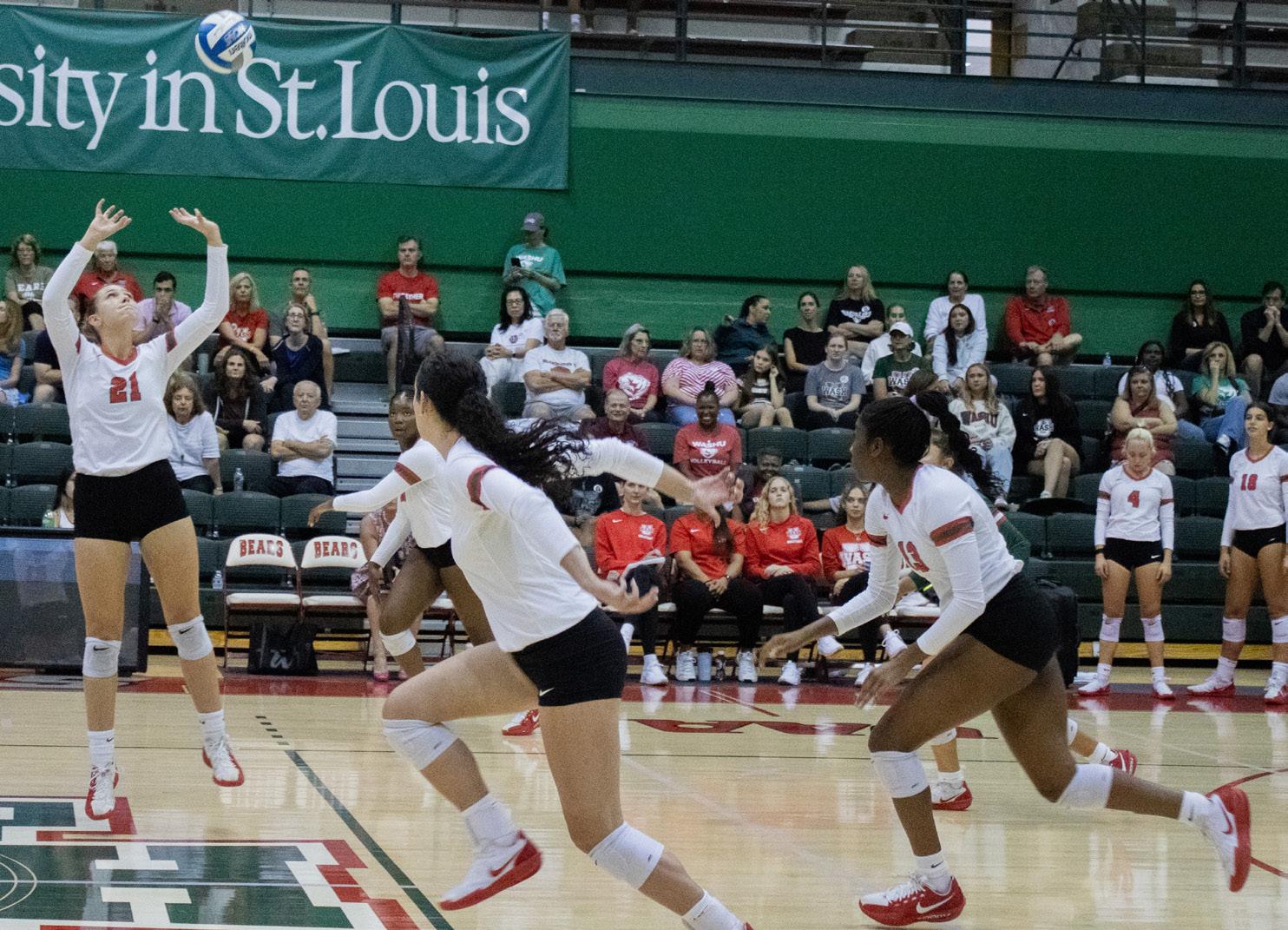
The WashU football team
defeated Carroll University 41-29 on Sept. 20, improving to 2-0 on the season.
Junior quarterback Levi Moore led the Bears wire to wire, throwing for 215 yards, four touchdowns, and no interceptions.
Moore also led the Bears in rushing, netting 114 yards in the contest. The win was the Bears’ first game against a College Conference of Illinois and Wisconsin (CCIW) opponent this season, marking their last season opener as a CCIW member in program history.
In their first away game of the season, the Bears got off to an early start after Moore connected with junior Drew Bomar on a 65-yard pass to put the Bears ahead 7-0. Less than three minutes later, the Pioneers responded to even the score at 7-7.
With two minutes left in the first quarter, Carroll found the back of the endzone, taking the lead. On the following play, WashU’s receiver Makael Carter, a junior, set a new program record after he returned the kick for a 98-yard rushing touchdown. Carter’s 98-yard return broke WashU’s returning record by just one yard, after wide receiver Collin Goldberg (Class of 2025) returned a kickoff for 97 yards in the 2023 season.
“That was an awesome moment. I really enjoyed every single moment of it,” Carter said. “That was the third time I got a kick return to me, and I was telling my teammates and every guy on special teams, just give me a chance. Just give me an opportunity, and I’ll make it count … We all ran into the endzone celebrating.”
Nearing the end of the first quarter, senior running back Fred Ware
scored a touchdown after Carroll fumbled the ball at their own five-yard line. At the very end of the quarter, the Pioneers received two points in a rare point after touchdown play. Sophomore kicker Matias Adrogue’s extra point attempt was blocked, and the Carroll defense returned it for a two-point conversion. While the Bears conceded points on the oddity, they still went into the second quarter with a 20-16 lead.
Carroll continued to gain momentum and apply pressure on the scoreboard in the second quarter. Down by only four, the Pioneers made a 28-yard field goal and then later scored a touchdown to take the lead, 26-20.
WashU responded with a touchdown from Bomar at the end of the second quarter. In previous matchups with Carroll, WashU led by more at the half; last year, WashU held a 21-0 advantage against Carroll at halftime. This year, though, they only led marginally, 27-26. One of the goals for the Bears this season is to always finish strong, no matter the strength of their opponents.
“We didn’t come out hot like we needed to. We knew we were the better team, yet we ended up in a dogfight,” Carter said. ”The coaches just told us to chill, take a break, and relax our minds.”
Despite WashU’s momentum at the end of the first half, Carroll continued to apply offensive pressure after they made a field goal at 8:11 and took the lead 29-27. With 3:35 left in the third quarter, Carter scored a crucial touchdown to give WashU the 34-29 lead.
The momentum shifted throughout the game, and Carter played a crucial role in the Bears’ ability to reclaim momentum, particularly in the second half.
“There were some big, crucial plays,” Carter said, “It was a big momentum-based game, so any touchdown I scored, or any play that I got, or any play that my teammates had, was essential.”
The Bears’ defense limited the Pioneers to only one field goal in the third quarter, an improvement from the first half. After an almost two hour weather delay between the third and fourth quarters, WashU continued growing their lead. The rain delay proved crucial in shifting the momentum of the game.
“[The delay] honestly helped us a ton,” Carter said. “We were able to gather our thoughts and come back like the team we should have been in the first half.”
With nine minutes left in the game, Carter made a crucial first down off a 36-yard pass. Just one play later, sophomore Lucas Blumenthal caught a sevenyard pass from Moore for a touchdown to put the score at 41-29, where it would last until the end of the game.
“On offense, we did our job, we did our thing,” Carter said. “And same thing with defense, they made tackles, they got stops. Ultimately, this allowed us to swing the momentum.”
Bomar and Carter lead in touchdowns this season with two each. Bomar also led with four receptions and 85 receiving yards.
Senior Ryan Schmadtke led the Bears with 10 tackles. Moore led in rushing yards with 112.
Next week, the team will face Division III’s defending national champions, North Central College, at home. WashU has a 1-10 record all-time with the Cardinals, with the last win coming in 2007. With the Bears leaving the CCIW at the end of the season, this will likely be their last regular season matchup against North Central.
